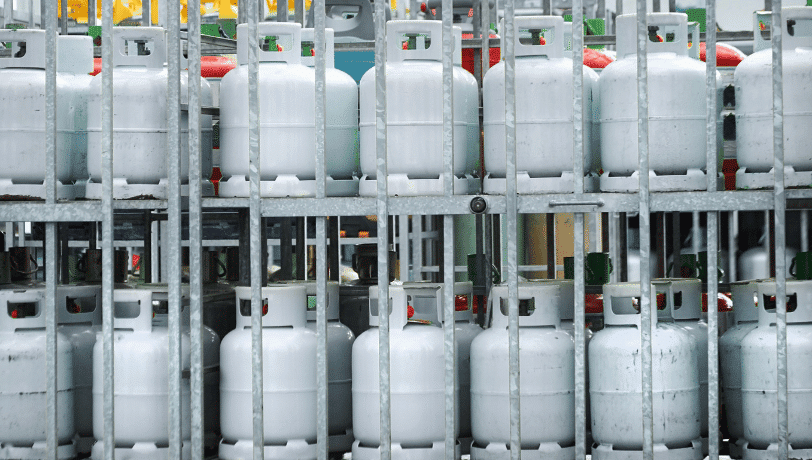Everyone in Australia is familiar with LPG as fuel for the BBQ at home or the LPG/propane stove for camping trips. However, some people don’t know about the many other commercial use applications for LPG, propane and butane, so it’s worth looking at their differences and advantages.
Propane vs Butane
Propane, LPG and butane are all liquefied petroleum gases, so in some ways, they are the same type of gas. Generally, the acronym LPG and the word propane are interchangeable, with propane being the preferred term in the United States and LPG preferred in Australia and New Zealand.
Propane has a lower boiling point than butane at -42°C vs -0.4°C. Propane also has about 4x the vapour pressure of butane. This makes propane a better choice for colder climates, while butane is an effective propellant due to its higher boiling point and lower vapour pressure. When stored as a liquid in a tank, propane exerts greater pressure than butane at the same temperature. This makes it very suitable for exterior storage even in cold weather.
Both Butane and Propane are heavier than air. Propane gas weighs 1.898 kg/m³ , Butane gas weighs 2.5436 kg/m³ whilst air weighs 1.225 kg/m³.
Although there are real differences between butane vs propane vs LPG, all three gases are actually LPG – Liquefied Petroleum Gases.
Effect of propane gas and butane gas on emissions
Propane and butane are clean-burning fuels that emit fewer pollutants or harmful refrigerants. They are low-carbon and safely transported. An increase in propane utilisation and a decrease in harmful emission fuel sources will help to improve air quality, reduce greenhouse gas (GHG) emissions and protect the environment. Here are some advantages of choosing the most environmentally friendly option with propane (LPG).
Lowering harmful emissions – Propane emits around 26% fewer greenhouse gases (GHGs) than gasoline in vehicles, 38% fewer GHGs than fuel oil in furnaces and half the carbon dioxide (CO2) emissions of a charcoal barbecue. It is an ideal fuel source for environmentally friendly household appliances.
Reducing pollution – Propane emits 60% less carbon monoxide (CO) than gasoline, 98% less particulate matter than diesel and contains virtually no sulphur, a contributor to acid rain. Using propane instead of other common fuels will reduce air pollution.
No spill hazard – Propane (LPG) gas cylinders are tough enough to handle regular shifting and transporting. In the unlikely event of a leak, propane becomes a vapour that dissipates quickly into the atmosphere.
No fugitive emissions – ‘Fugitive emissions’ is a term for gas that escapes into the atmosphere before being combusted. Propane is a smart environmental choice as it isn’t a greenhouse gas and won’t impact the atmosphere if accidentally released prior to combustion.
Consider weight before purchasing your camping propane tank
Backpacking is fun, but the novelty will soon wear off if your pack is overweight with a heavy gas stove. Consider carrying one or two small butane canisters and a simple camping stove. These canisters are cost-effective and energy-efficient for spending a glorious day or two camping solo or with a friend.
If travelling by car or motorhome, make sure to visit SWAP’n’GO and fill up your 8.7kg and 3.7kg gas cylinders before hitting the road. LPG gas (Propane) and Butane are useful fuel sources for enjoying the Australian outdoors. For LPG service, including 45kg, 90kg, and 210kg cylinders for home or business use, contact your nearest ELGAS distributor.
Propane Uses
Propane has a high octane rating, making it a great choice for use with spark-ignited internal combustion engines. If spilled or released it presents no threat to the soil, surface water, or groundwater.
Propane is produced as a by-product of natural gas processing and crude oil refining. Its main uses include home heating and stand-alone heaters, hot water, cooking, refrigeration, clothes drying and powering farm and industrial equipment. The chemical industry also uses propane when making plastics and other compounds.
Butane Uses
Butane is a highly flammable hydrocarbon gas. It’s colourless, odourless and easily liquefied. Butane is typically used as fuel for lighters and portable stoves. It’s also a propellant in aerosols, used as a heating fuel or as a refrigerant, and is used in the manufacture of a wide range of products. Butane is also found in liquefied petroleum gas (LPG).
Since 1987, hydrocarbons have replaced chlorofluorocarbons (CFCs) as the most common propellant used in aerosols. Today, butane is found in numerous aerosol products.
Choosing the right gas for flexible application
In Australia, we are fortunate to have access to abundant energy supplies. We are also a country of extremes, where different approaches to energy use and sustainability are appreciated. From natural gas to propane and butane, the choices are available for Australian homeowners and business owners. Propane (LPG) plays a significant role, particularly in rural and regional areas not covered by the Australian natural gas pipeline network.
ELGAS understands the equation, with more than 40 service centres around the country. There’s bound to be an ELGAS near you for convenient supply and distribution of clean-burning LPG for your home gas or business gas needs. At ELGAS, We’ve perfected the delivery process, including our automated tanker delivery system and commercial bulk delivery systems. We also source quality LPG appliances from well-known brands such as Rinnai, Bosch, Paloma, Cannon and Dux.
Keep temperature sensitivity in mind when choosing the right fuel
Australia is a big country from the tropics to the snowy south, so it’s important to take the right outdoor gear with you. When it comes to outdoor cookers, butane burns perfectly fine in warm weather. However, when the temperature plummets below freezing in high altitudes you’re better off opting for propane which has a much lower boiling point.
